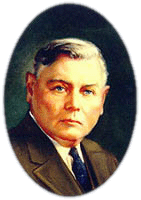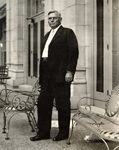|
|
Ross Shaw Sterling (1875-1949), governor of Texas, son of Benjamin Franklin and Mary Jane (Bryan) Sterling, was born near Anahuac, Texas, in February 1875. Biographical sources give different specific birthdates of February 11 and February 22. He attended public schools and farmed until about 1896. He opened a feed store at Sour Lake in 1903, and during the next several years he also entered the banking business by purchasing a number of banks in small towns. In 1903 he became an oil operator and in 1910 bought two wells, which developed into the Humble Oil and Refining Company. The company was officially organized in 1911, and Sterling was president. In 1918 he also was president and owner of the Dayton-Goose Creek Railway Company.
In 1933 Sterling returned to Houston, where he appeared little in public life, but in a few years had built another fortune in oil. He was president of the Sterling Oil and Refining Company from 1933 to 1946. He was president of the American Maid Flour Mills and the R. S. Sterling Investment Company and was chairman of the Houston National Bank and the Houston-Harris County Channel Navigation Board. Sterling married Maud Abbie Gage on October 10, 1898; they were parents of five children. Among his philanthropies were the gift of his La Porte home to the Houston Optimist Club for a boys' home, establishment of a boys' camp in memory of Ross Sterling, Jr., who died in 1924, and the contribution of $100,000 to Texas Christian University. He was a Democrat and a Mason. Sterling died in Fort Worth on March 25, 1949, and was buried in Glenwood Cemetery in Houston. BIBLIOGRAPHY: Houston Post, March 26, 1949. Henrietta M. Larson and Kenneth Wiggins Porter, History of Humble Oil and Refining Company (New York: Harper, 1959). Ross Shaw Sterling Papers, Barker Texas History Center, University of Texas at Austin. Vertical Files, Barker Texas History Center, University of Texas at Austin. Who's Who in America (1934-35). Reprinted with permission from the Handbook of Texas Online, a joint project of the Texas State Historical Association and the General Libraries at the University of Texas at Austin. © 2003, The Texas State Historical Association.
|

